Dr Kush Patel (they/he): kush.patel@manipal.edu
Faculty Member and Head of Studies (MA in Technology and Change)
Subscribe to our Monthly Newsletter
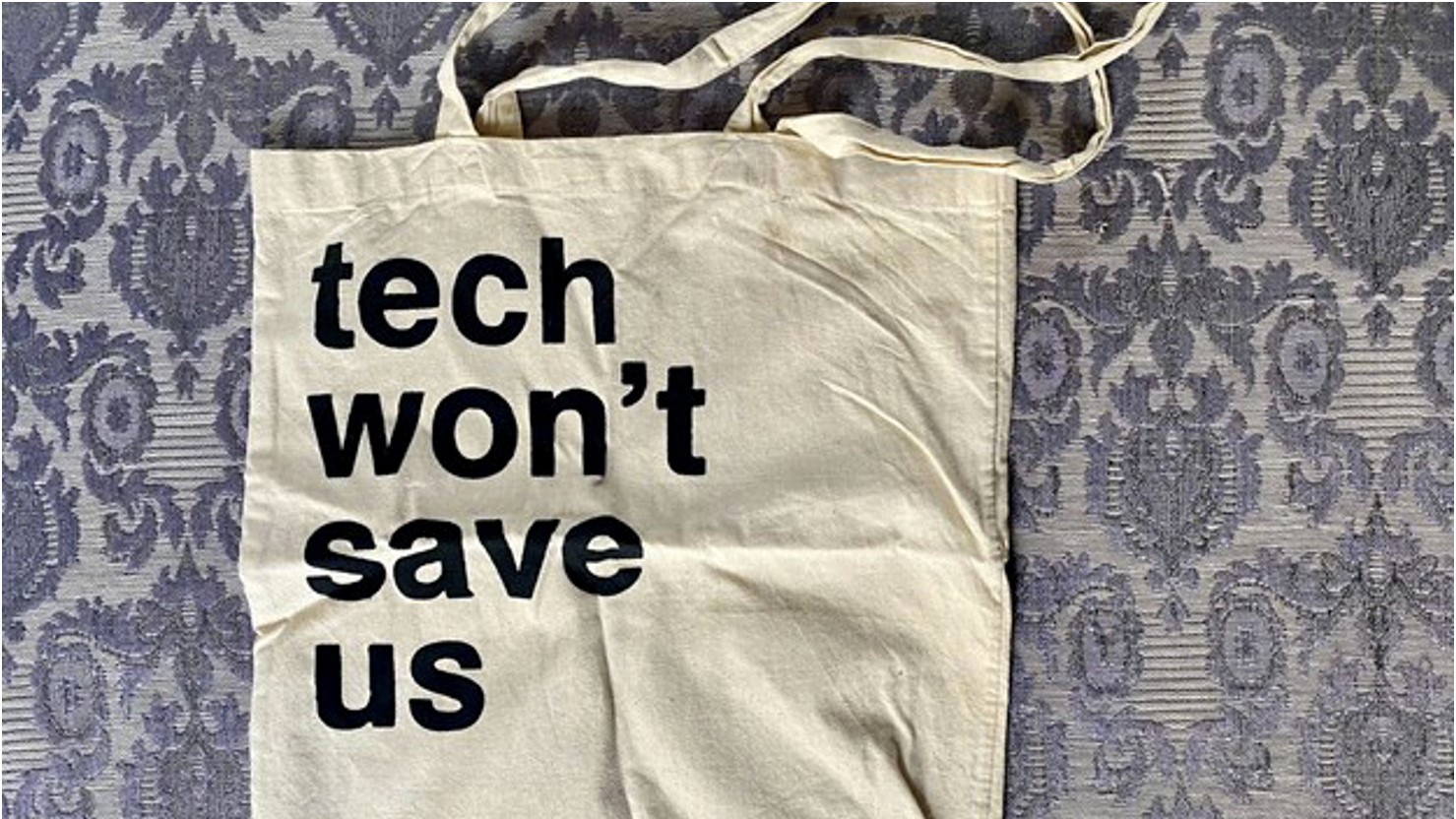
Image: “tech won’t save us” follows the rallying call of techwontsave.us to inquire into the integration of technology and politics along socially just lines. Image courtesy of Kush Patel.
Vision
The Just Futures Co-lab acknowledges technologically mediated futures in the plural and as visions and inquiries that are also structurally accessible and socially just. The “co-lab” makes explicit in name and practice the anti-caste, anti-colonial, queer, and feminist processes and politics of collaborative and community-centered knowledge production and project making in and with the digital.
Orientations and Approaches
With an orientation to learn from, with, and alongside individuals and communities along the campus-community spectrum, the Co-lab will center inquiries and connections that respond to and remain rooted in participatory learning, equitable labor, mutual accountability, and embodied research across its project spaces. The lab acknowledges how digital technologies aid in social exploitation, surveillance, disenfranchisement, and even epistemic and spatial violence. Our humanities- and design-based approaches to digital research and pedagogy, we expect, will not only produce cultural critiques, but also model possible alternatives for scholarly and interpersonal care in all such co-productions.
Values
Positionality: The Co-lab’s approach to scholarship is orientated towards engaged and ethical knowledge-making work in and around situated, interconnected, and socially just futures. This work would include orientations, approaches, and modes of engagement that are as much inward inquiries as much as out-there involvements.
Collectivity: The Co-lab will function as a pedagogical space of collective and community-centered learning. The lab’s goal is to scaffold, foster, incubate, and mentor graduate scholarship, as well as ideas and methodologies that may extend into directions beyond the curriculum.
Care: The critiques we produce will ongoingly further care-based relations with the people, lands, networks, and infrastructures that jointly constitute the context in which we live, learn, and hold ourselves accountable.
Inquiries and Project Spaces
The Just Futures Co-lab furthers two interconnected inquiries, namely, Intersectional Feminist Histories and Futures and Critical Digital Humanities Pedagogy. It is in the overlap of these inquiries that I have located the project spaces of Queer Futurities and Futures with the “Peripheries.” Each of these project spaces will serve as a home for transdisciplinary research involving graduate students as well as related non-academic and academic partners. The inquiry and project space descriptions are as follows:
Intersectional Feminist Histories and Futures
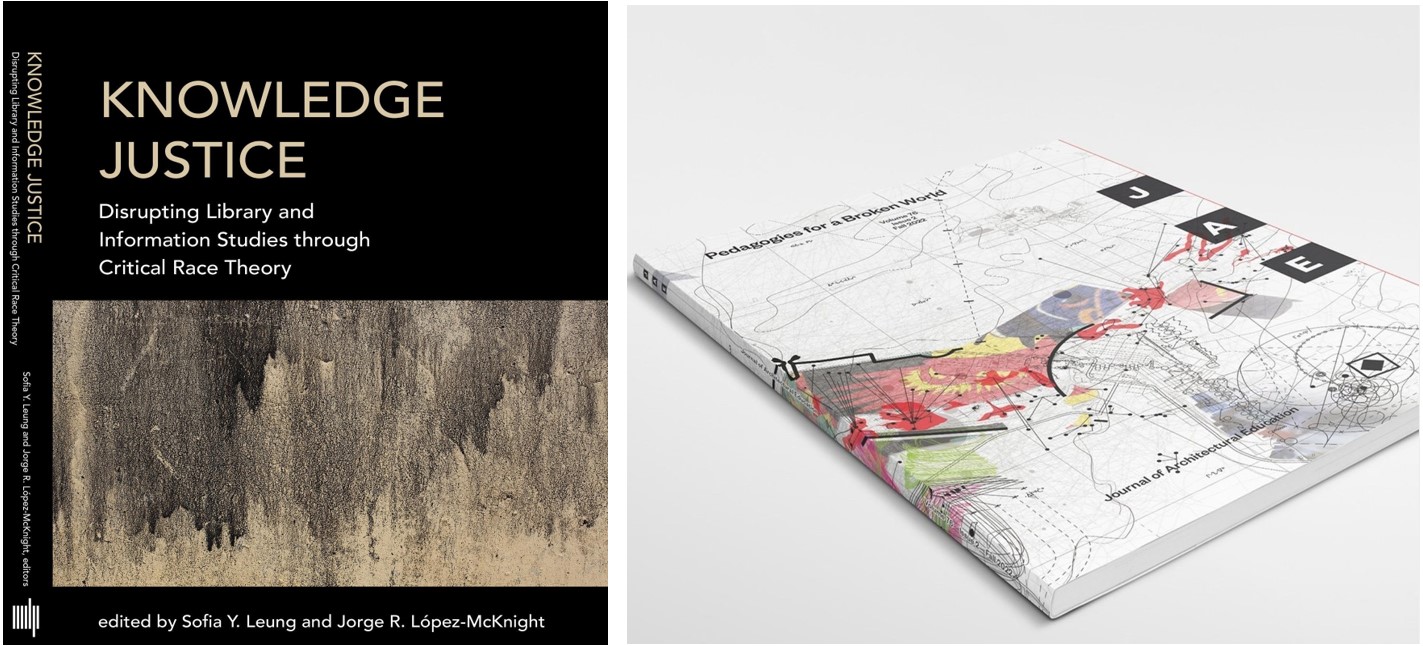
L: [Book Chapter] Anne Cong-Huyen and Kush Patel, “Precarious Labor and Radical Care in Libraries,” in Knowledge Justice: Disrupting Library and Information Science through Critical Race Theory, edited by Sofia Leung and Jorge R. López-McKnight (The MIT Press, 2021), pp. 263-282. Image Courtesy of We Here Collective in Library and Information Science.
R: [Journal Article] Kush Patel, Johnson Jament, Merin Mathew, “Framing Survival: Questions of Safe Space in Design Pedagogies” in Pedagogies For A Broken World, JAE (Journal of Architectural Education) 76:2, edited by Jay Cephas, Igor Marjanović, Ana Miljački (October 2022), pp. 190-192. Image Courtesy of JAE.
Discourses on collective speculations and critical design as well as feminist techno-utopias critique both commercial and “mainstream” design thinking, design research and innovation, which often operate towards imagining and developing only a particular kind of future globally as a universal, patriarchal, and colonizing force. However, these discourses are also challenged by counter-perspectives of decolonizing its current white, cis-het, able-bodied, upper caste, and settler perspectives, calling for a more just practice that is rooted in local, heterogeneous, and trans-national ways of knowing, living, and thinking about our interdependent futures.
Critical Digital Humanities Pedagogy
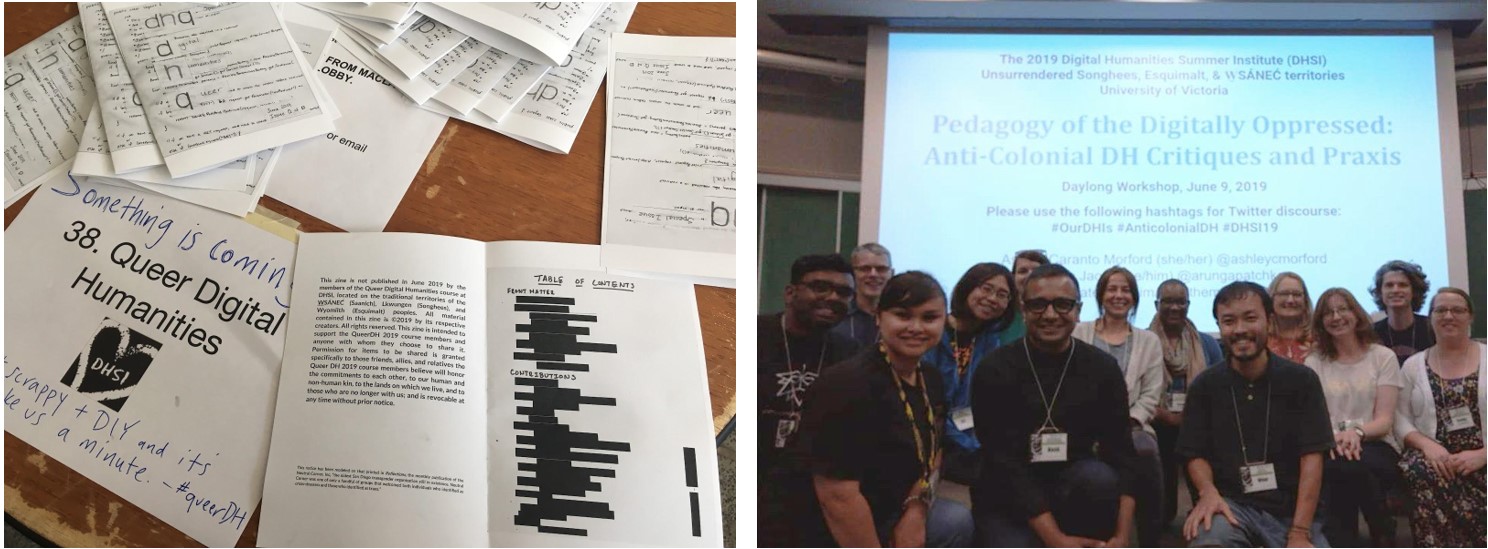
L and R: Queer DH and Anti-Colonial DH Pedagogy Workshops, Digital Humanities Summer Institute (DHSI), University of Victoria, BC, Canada, 2019. Images Courtesy of Kush Patel.
Pedagogical practices in and with the digital often involve a preoccupation with tool-based skill acquisition, product-centered learning, and computational research engagements that seldom critique the colonial, capitalist, white supremacist, patriarchal, and upper caste oppressions built into mainstream computer systems and replicated in the field of digital humanities (DH). Critical DH pedagogy is concerned with grounding the discourse on learning with digital technologies not only in these very histories and genealogies of oppression, but also related community-centered resistances so that our syllabi, classroom environments, and projects in the humanities can have ongoing accountabilities and just legacies.
Project Spaces: Trans-Disciplinary Research with PG Students
Queer Futurities
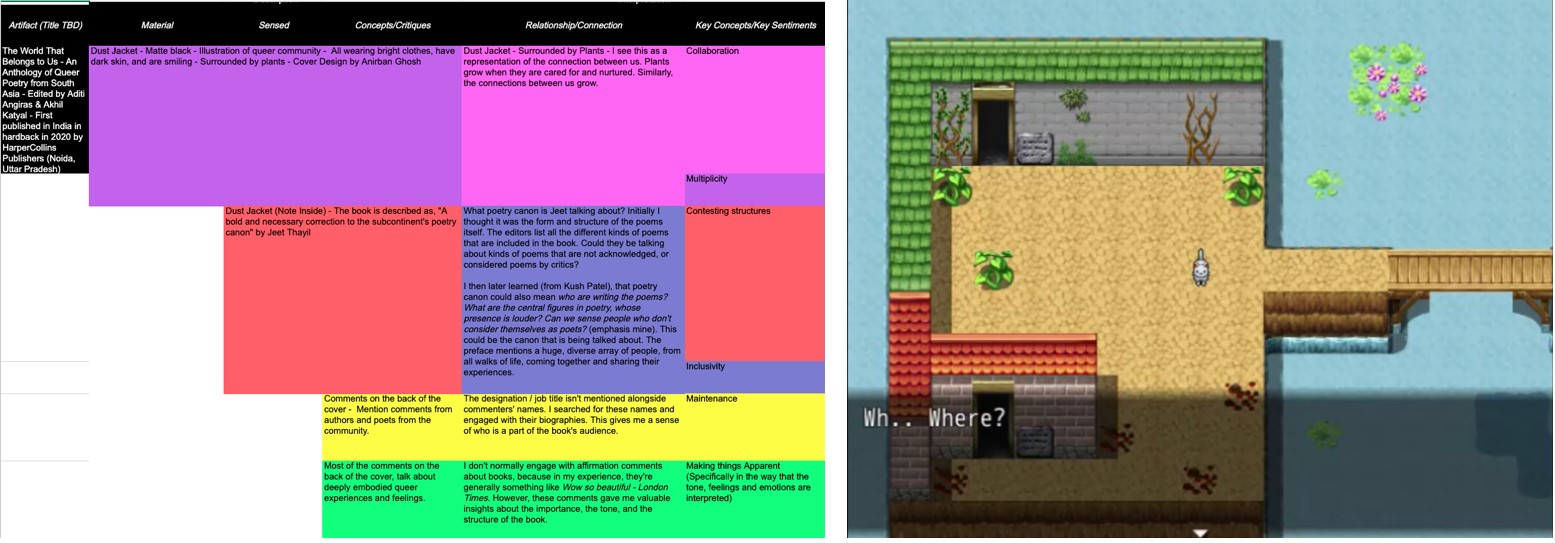
L: A Screen Capture of Shamanth Joshi’s “Felt Bibliography” transdisciplinary inquiry (2021). Image Courtesy of Kush Patel.
R: Opening Scene of Shamanth Joshi’s video game entitled “There’s Always Room to Be You” as an outcome of their Capstone project entitled, “Queer Reimagination of Digital Role-Playing Games” (2022) [Private]. Image Courtesy of Shamanth Joshi.
What constitutes a queer archive? What is its material form, content, and location? What are the personal, community, and/or institutional dimensions of its construction and maintenance? What are the design strategies of keeping an archive of queer work alive and meaningful for everyday survival? This project space invites folx interested in co-building a diverse bibliographic database on queer individuals’ intersections with design; on projects centering queerness in design; and on works about queer designers. We will approach design in relation to space, infrastructure, technology, and social change, or the making and remaking of worlds—including, but not limited to, ecologies and histories of the built environment—“by any media necessary” (Sasha Costanza-Chock 2020). We will preface this pilot with an understanding that the histories and identities of gender and sexuality are plural and that the analytical complexity of this multiplicity connects to and overlaps with experiences of race, indigeneity, caste, class, disability, faith, education, language, and geographical difference.
Futures with the “Peripheries”
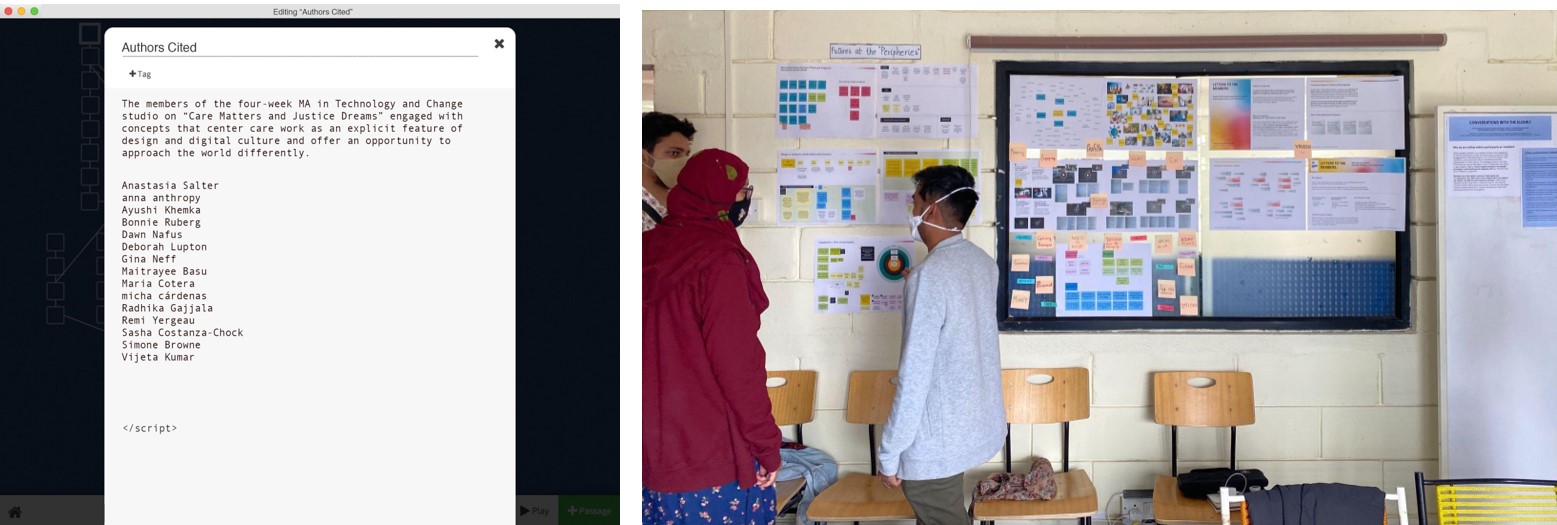
L: Digital Storytelling with Twine, MA in Technology and Change Studio on Care Matters and Justice Dreams, Srishti Manipal Institute of Art, Design, and Technology, Cycle 1 2021. Image Courtesy of Kush Patel.
R: Inquiries into the Futures at the Peripheries Project and Presentation by Vikash Raj (December 2021). Vikash (and Pragya Sinha) produced methodological reflections on elderly individuals' engagements with and notions of digital technology, or what digital-tech and digital tech-led futures means to them—and in the process, they questioned prevalent terms like the digital native. Image Courtesy of Kush Patel.
What are the epistemological underpinnings of technological artifacts and infrastructures, including digital tools and projects? What ethical and political implications are inherent in the production of such artifacts and infrastructures, especially as they relate to questions of accessibility, accountability, protection, and collaboration with individuals and groups who may traditionally have been viewed as peripheral to digital life? How might we understand infrastructural care work in relation to these questions? And how does this care work extend into critical digital humanities instruction and pedagogy? This project space invites folx interested in establishing a critical relationship with digital tools; in challenging the prevalent thinking-making binary connected to technological projects; in honing individual interpretive capacities; and in developing techniques that produce technologies within and connected to historical, legal, and geographical locations that have been minoritized in professional discourses and practices. We will throw open these questions for study and argumentation in community and invite possibilities for their conceptual and material reimaginations.
Public Seminar and Reading Group Series
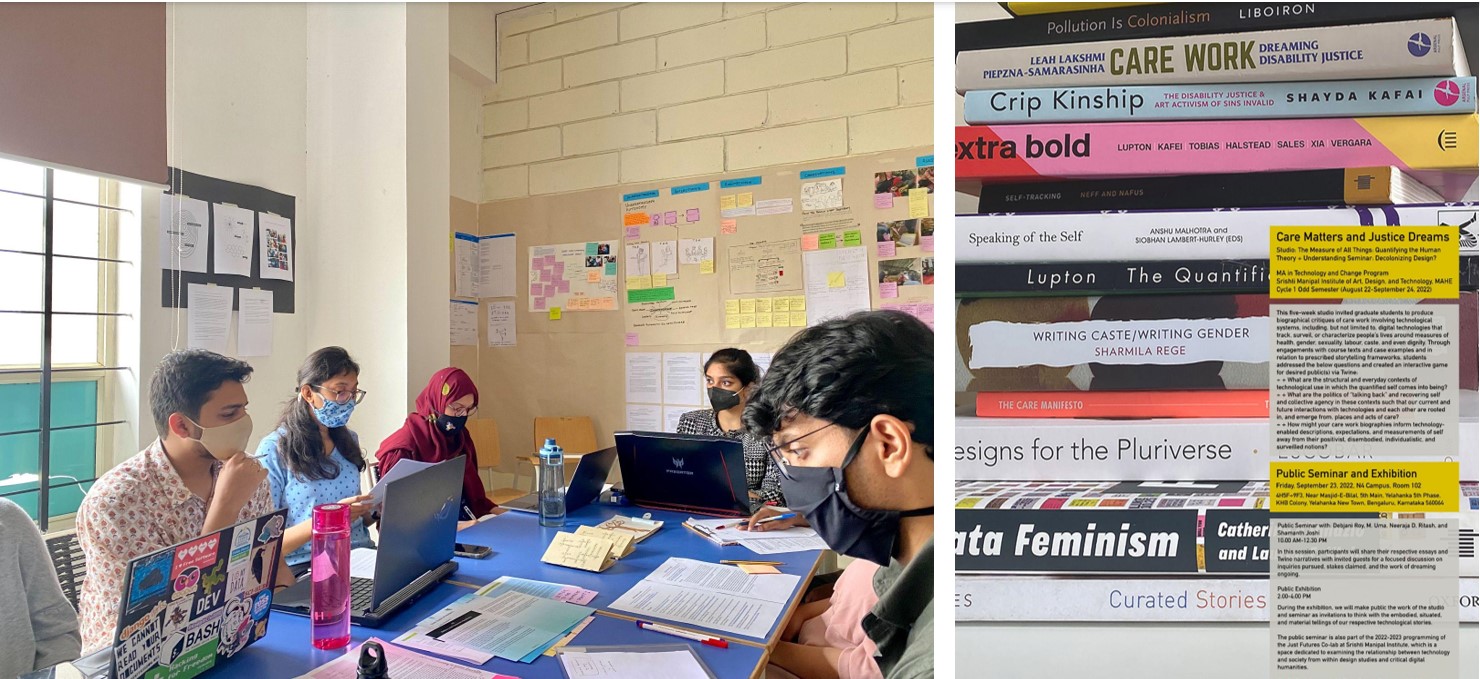
L: Citations in Practice Reading Seminar 02 (December 2021). Image Courtesy of Kush Patel
R: Care Matters and Justice Dreams Studio and Public Seminar (October 2022). Image Courtesy of Kush Patel.
As a space for scholarship and pedagogy, we will be coordinating a yearlong seminar and reading group series to complement and deepen the work of the Co-lab. The programming of this series will involve graduate students who might be interested in leading with the scholarly dimensions of each project and in working with me to culminate the year with a supporting open-access publication.
Contact Information
To learn more about the Just Futures Co-lab and discuss possibilities for collaboration, internships, and talks, please contact Dr Kush Patel at kush.patel@manipal.edu
